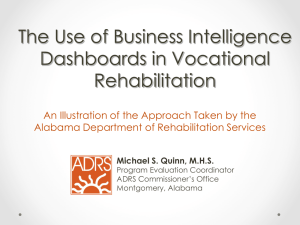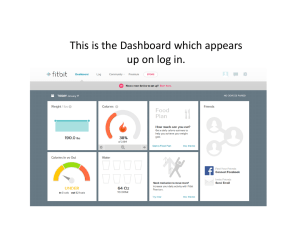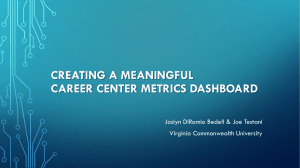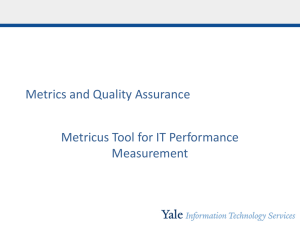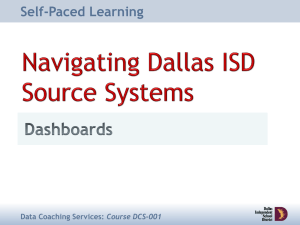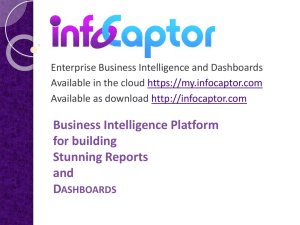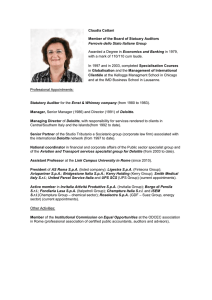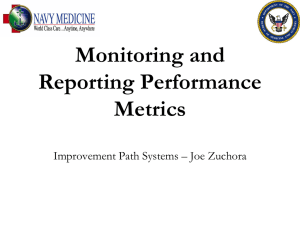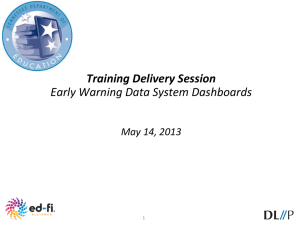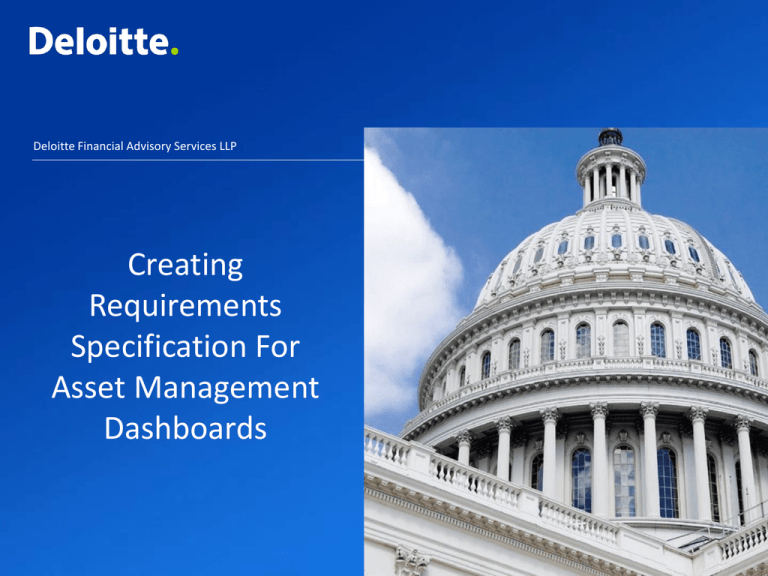
Deloitte Financial Advisory Services LLP
Creating
Requirements
Specification For
Asset Management
Dashboards
Introduction
• Dashboards, if properly designed, can help you manage your operations
more effectively and efficiently
• A properly designed dashboard caters to the needs of the user and is built
around well-defined requirements specification
• The user must play an integral role in developing the requirements
specification
Copyright © 2011 Deloitte Development LLC. All rights reserved.
Dashboard Fundamentals
Key Definitions & Concepts
Characteristics
Benefits
Copyright © 2011 Deloitte Development LLC. All rights reserved.
Key Definitions & Concepts
Dashboard: A user interface that organizes, integrates, and presents mission critical
information, pulled from multiple sources, to users in a way that is easily read and
understood.
Performance Management: Process of measuring progress toward achieving key goals
and objectives in a manner designed to optimize organizational performance.
Business Intelligence (BI): The tools, techniques, and processes involved in turning
data into information, and information into knowledge in a manner designed to
optimize decision making. BI encompasses technologies for data warehousing, data
mining, data integration, reporting and analysis.
• Dashboards integrate and synthesize Performance Management and Business
Intelligence.
• The combination of Performance Management and Business Intelligence can
provide a powerful new way to communicate strategy within an organization and
monitor and analyze organizational activity.
Copyright © 2011 Deloitte Development LLC. All rights reserved.
Dashboards Characteristics
• Three Primary Applications:
o
o
o
Monitoring
Analysis & Reporting
Management
• Three Layers: Most distinctive feature. Allows
user to peel back layers of information to get to
the root cause.
o
o
o
Graphical abstracted data – designed
to help monitor key metrics
Summarized dimensional data –
designed to help identify root causes
Detailed operational data – designed to
help identify needed corrective action
• Three Types:
o
o
o
Operational Dashboards – emphasize
monitoring
Tactical Dashboards – emphasize
analysis
Strategic Dashboards – emphasize
management
Copyright © 2011 Deloitte Development LLC. All rights reserved.
Dashboard Benefits
Dashboard Benefits include:
• Communicating and managing strategy: Dashboards can serve as agents to help
organizational change.
• Monitoring and oversight: Dashboards can provide each group of users with
information and analytical capability that is tailored and appropriate to their role.
• Consistent view of the organization: Dashboards can provide an organization with a
single, concise and common vision of truth.
• Timely delivery of actionable information: If designed and used properly, Dashboards
can deliver the right information to the right user at the right time to help decisionmaking, enhance efficiency and accelerate bottom-line results
Feedback from Dashboard User: Greg Kuechler, Dir. OUSD(C) Performance Measurement Team
“What’s best about the Dashboard designed for us is that it made us high speed and
low drag relative to the painful process we used to follow to generate performance
information. What’s more, by making the metrics so easy to get to with just a few
clicks of the mouse, the Dashboard has really helped us socialize and internalize our
focus on performance.” 1
1Patricia
Dees, “Putting the “Dash” in Dashboards,” American Society of Military Comptrollers, January 2009.
Copyright © 2011 Deloitte Development LLC. All rights reserved.
Dashboard Benefits (continued)
Dashboard Benefits Include:
• Integration of data from multiple sources: BI tools allow data from multiple data silos
to be represented on a single Dashboard
• Reduced costs and redundancy: BI capabilities can help analysts to gain quick insights
from large amounts of data in ways that would be otherwise impossible or cost
prohibitive.
• Root Cause Analysis: Dashboard can allow users to drill down into the details when
abnormal trends are spotted in the summary reports.
• Advancing organizational maturity: Dashboards give a clear view of key data points
that may be used to assess the organizations progress toward specific goals.
Case Study – City of Oxnard, California, AssetWorks, 2009
In 2005 the City of Oxnard, CA, established multiple key performance indicators and
set up Dashboards to illustrate them. Its goal was to transform data into practical
usable information to analyze and guide resolution of problems. The City called it
true management through facts. In 2008 it was recognized by Government Fleet
magazine as the #3 Public Sector Fleet in the USA. 2
2Case
study – City of Oxnard, California, AssetWorks, 2009.
Copyright © 2011 Deloitte Development LLC. All rights reserved.
Dashboard Deployment
Beware of “Quickie” Dashboards
Embrace Leading Practices
Conduct Thorough Requirements Specification
Copyright © 2011 Deloitte Development LLC. All rights reserved.
Beware of “Quickie” Dashboards
Effective Dashboards require careful planning, design and implementation.
Dashboard requirements should be determined by thorough assessment of important
organizational needs. Rushed and poorly designed dashboards can result in some of
the following:
• Limited drill-down capability – does not allow execution of root cause analysis.
• Difficult to use and maintain – requires extensive IT expertise and time to maintain
and modify.
• Data silo – cannot provide single view of performance across organization.
• Fancy but functionally ineffective graphics – does not show the data dimensions
necessary to make a decision clearly and accurately.
Copyright © 2011 Deloitte Development LLC. All rights reserved.
Dashboard Deployment Leading Practices
The adoption of industry leading practices, operating tactics and winning strategies
helps organizations chart courses to superior dashboard performance. Leading
practices include:
• Develop a Clear Strategy – Develop clear strategy on what is expected from the
Dashboard solution so it can be designed to live up to its purpose as an efficient and
actionable BI tool.
• Develop Effective Metrics – Involve both functional and technical personnel in
developing metrics.
• Plan for Real Time – A performance management system populated with more real
time data will allow executives and managers to keep their fingers on the pulse of
the organization.
• Plan for the Long Haul – Prepare for 20% growth in users, 15% growth in queries,
and four to five new data sources each year. Design system to accommodate this
growth.
• Develop on a Single Platform – The risk of failing to do so is that when managers
build their own Dashboard solution independent of each other, the resulting
Dashboard silos eventually compete with each other for resources.
Copyright © 2011 Deloitte Development LLC. All rights reserved.
Dashboard Requirements Specification
Requirements specification process provides a structured methodology for defining the
full range of organizational and technological requirements. Steps in the process include:
Define the need
Define the user
Define dashboard type
Assemble stakeholders
Fix system boundaries
Requirements elicitation
Analyze, prioritize, specify
Copyright © 2011 Deloitte Development LLC. All rights reserved.
Conclusion
• Well designed and developed Dashboards generally result from careful planning
driven by thorough requirements specification.
• Well designed and developed Dashboards can offer insight, explanations, and shared
understanding of critical organizational information, and then allow the users to act
upon the information when and where necessary.
Copyright © 2011 Deloitte Development LLC. All rights reserved.
About Deloitte
Deloitte refers to one or more of Deloitte Touche Tohmatsu Limited, a UK private company limited by guarantee, and its network of member firms, each of
which is a legally separate and independent entity. Please see WWW.deloitte.com/about for a detailed description of the legal structure of Deloitte Touche
Tohmatsu Limited and its member firms.
Copyright © 2011 Deloitte Development LLC. All rights reserved.
Member of Deloitte Touche Tohmatsu Limited

